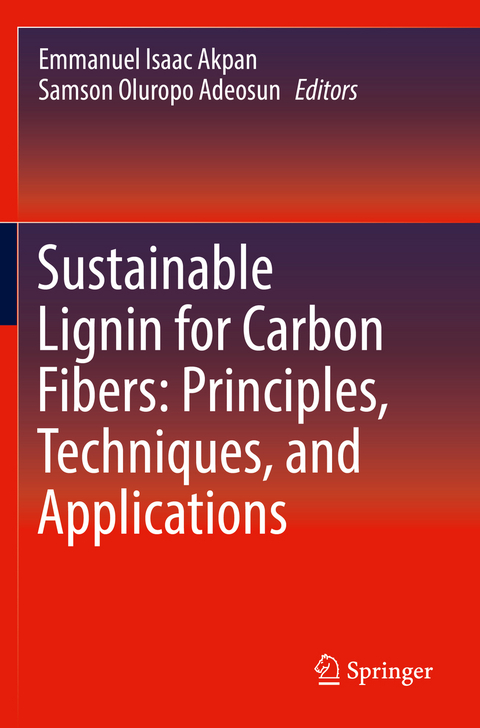
Sustainable Lignin for Carbon Fibers: Principles, Techniques, and Applications
Springer International Publishing (Verlag)
978-3-030-18794-1 (ISBN)
This book is designed to provide wide understanding of lignin carbon fiber processes, chemistry, mechanisms, and techniques that will help in further development of lignin carbon fiber for automobile, aerospace, marine, and sports equipment applications. Each step in the processing of lignin carbon fibers is presented as a separate chapter so that issues concerning the processes are exhaustively discussed. Basic scientific principles governing each stage of lignin carbon fiber processing, current state of research and mechanisms behind the processes are illustrated for better understanding. This is the first book to address the entire scope of lignin carbon fiber processing including; extraction, quantification, purification, melt processing, stabilization, carbonization, optimization of processes, and characterization.
- Presents detailed information on the chemistry, processing, principles and properties of bio-sourced lignin for carbon fiber production;
- Highlights techniques of recovery and properties of lignin from agricultural waste sources;
- Addresses applications in automobile, aircraft, marine, and sport industries;
- Provides insight into the lignin complex macromolecular system, the role of lignin chemistry as it relates to carbon fiber production and the evolution of lignin carbon fiber structure during processing.
lt;p>Emmanuel Akpan is a Research Scientist at the Institute for Composite Materials in Kaiserslautern, Germany. Currently, his research focuses on the development of bio-based polymer composites for heat deflection and fire retardant applications in automobiles.
Samson Adeosun is Professor of Materials Science and Engineering at the University of Lagos, Nigeria. He has been working on the development of bio-based composite materials for lightweight applications. Current research in his lab focuses on the extraction and purification of lignin from wastes sources for carbon fiber applications.
Chapter 1. Chemistry and Structure of Lignin.- Chapter 2. Lignin Conversion to Carbon Fiber.- Chapter 3. Bio-Sourced Lignin: Recovery Techniques and Principles.- Chapter 4. Bio-Sourced Lignin: Sources and Properties.- Chapter 5. Characterization Techniques and Quality Assessment of Lignin and Lignin Carbon Materials.- Chapter 6. Melt Processing of Lignin.- Chapter 7. Stabilization of Lignin Fibers.- Chapter 8. Carbonization, Activation and Graphitization of Lignin based Materials.- Chapter 9. Lignin Carbon Fibres: Properties, Applications and Economic Efficiency.- Chapter 10. Surface Treatment of Lignin Sourced Carbon Fibers: Principles, Processes and Challenges.
| Erscheinungsdatum | 24.07.2020 |
|---|---|
| Zusatzinfo | XI, 454 p. 295 illus., 139 illus. in color. |
| Verlagsort | Cham |
| Sprache | englisch |
| Maße | 155 x 235 mm |
| Gewicht | 791 g |
| Themenwelt | Technik ► Elektrotechnik / Energietechnik |
| Technik ► Maschinenbau | |
| Technik ► Umwelttechnik / Biotechnologie | |
| Schlagworte | bio-sourced lignin • Carbon fiber precursor • Car with Lignin Carbon Fiber • Extraction Processes • Lignin-based Carbon fiber • Lignin-based carbon fiber for automotive • Lignin-based carbon fiber in aerospace • Lignin for biomaterials • lignin from wastes sources • Lignin Polymers • Optimization of carbon fiber • renewable materials • Structural components • Techniques of recovery |
| ISBN-10 | 3-030-18794-2 / 3030187942 |
| ISBN-13 | 978-3-030-18794-1 / 9783030187941 |
| Zustand | Neuware |
| Haben Sie eine Frage zum Produkt? |
aus dem Bereich


